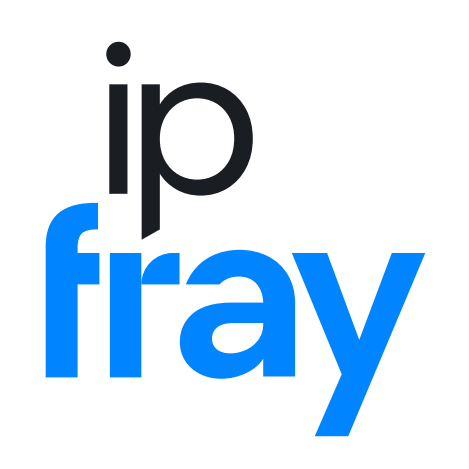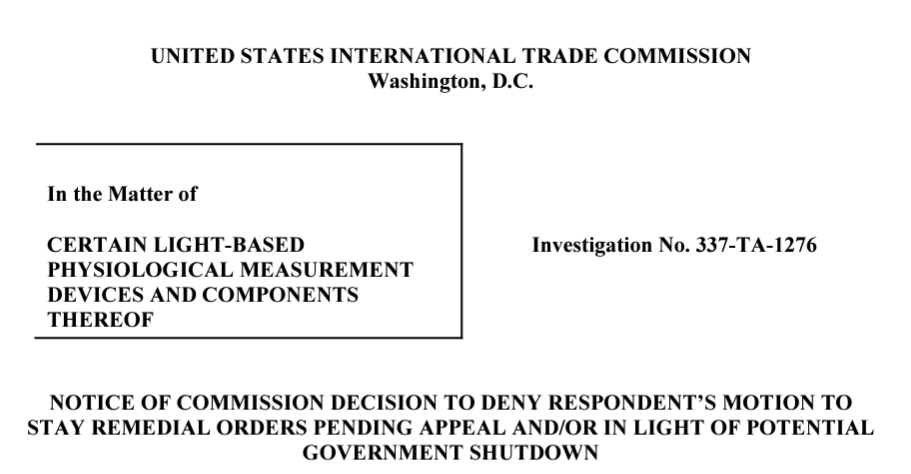Context: On October 26, 2023, the United States International Trade Commission (ITC), a U.S. trade agency with quasi-judicial powers, issued a final determination in the matter of Certain Light-Based Physiological Measurement Devices and Components Thereof further to a patent infringement complaint by Masimo and Cercacor Laboratories of Irvine, CA. On December 20, 2023, the ITC denied an Apple motion to stay enforcement (PDF). A couple days earlier, it was reported that Apple halted U.S. sales of the Apple Watch Series 9 and the Apple Watch Ultra 2. The feature at issue is the way certain Apple Watches measure oxygen level measurement.
What’s new: A Presidential veto (the first in more than a decade) could theoretically have bailed Apple out on public-interest grounds. There is a 60-day period for that, which has now ended (it’s already December 26 in Washington, D.C.). The United States Trade Representative (USTR), a White House official to whom U.S. presidents generally delegate this veto power, has declined Apple’s invitation to veto the exclusion order (Channel News Asia).
Direct impact: Apple apparently expected this outcome. According to Masimo’s CEO, Apple has not reached out regarding a license agreement, which the complainant would be open to. Instead, Apple is said to be developing a workaround that would soon avoid any infringement of the patents underlying the U.S. import ban. It remains to be seen whether Masimo will make Apple an offer that represents a better choice than a disruption (albeit temporary) of U.S. sales as well as repairs and replacements requested by U.S. consumers. Also, Apple can now seek emergency relief from the United States Court of Appeals for the Federal Circuit, which could lift the import ban very quickly if it identified clear legal error in the ITC decision.
Wider ramifications: The apparent decision by the Biden Administration to decline Apple’s invitation to overrule the ITC shows that the U.S. government is hesitant to compromise intellectual property enforcement, even if the largest and richest U.S. company is on the receiving end. That preserves the credibility of the U.S. administration, and particularly of the USTR, in trade talks and other diplomatic efforts related to foreign patent policy, such as U.S. criticism of the European Union’s envisioned regulation on standard-essential patents. Apple has considerable lobbying clout, though it may politically prioritize certain platform (particularly app store) monopoly issues over IP enforcement. And by letting the import ban take effect, Apple once again shows it is the opposite of a soft target for patent holders.
Please note that this article was written based on the silent expiration at midnight (Eastern Time) of the Presidential veto deadline, which combined with the measures taken by Apple in recent days suggests the import ban is now indeed in force and effect. When this article went live, almost an hour had passed since the expiration of the deadline without any sign of the import ban having been lifted. Update: Channel News Asia later confirmed that the USTR has declined to veto the ITC order.
This means U.S. Customs and Border Protection (CBP) officers would have to seize imports of the products at issue unless Apple can show that new imports are no longer infringing under the ruling. Practically, it appears that Apple simply will not even let it get to that point as it already halted sales.
It cannot be ruled out 100% in the absence of an agency’s or party’s public statement that a veto was ordered and has not been made public yet, but it appears sufficiently unlikely that ip fray decided to comment.
Based on its research, ip fray does not have reason to believe that any of the actors (U.S. government, Apple, Masimo) is acting unreasonably or in bad faith:
The U.S. government needs to remain consistent with the positions it takes on the international stage, where the IP policy agenda is generally to protect U.S. innovators’ ability to enforce their rights in foreign jurisdictions. It would be hypocritical if a U.S. import ban ordered on the basis of an identified (though appealable and possibly incorrect) infringement of multiple patents when there is no serious public-interest issue. Apple’s continued sales are a private company’s interest. Access to those products is in the interest of some consumers, but other smartwatches remain available. In 2013, the public-interest issue was not so much that an old iPhone model would be excluded from the U.S. market, but the legal basis on which Samsung sought an import ban. That case involved a standard-essential patent (SEP), and the Obama Administration seized the opportunity to warn against SEP abuse. No such circumstance exists in the present case.
Masimo has the right now to let U.S. Customs and Border Protection enforce the ban. They won, the ITC denied Apple’s motion for a stay, and it appears that the USTR equally declined Apple’s invitation to prevent enforcement.
Apple, however, also has certain rights. There is nothing unlawful about simply complying with the exclusion order (import ban) and working around it while seeking a stay from the Federal Circuit.
Apple is not a thief here. The ITC did not identify a willful infringement. Apple developed the relevant blood oxygen measuring techniques independently. The mere fact that they had “poached” (as Masimo claims) some of the patent holder’s employees does not prove willful infringement. But patent law is a strict liability regime, meaning that Apple can be held responsible even if it committed no intentional wrongdoing.
Some will now accuse Apple of using its resource advantage against a small company. But patent law has given the little guy some leverage. It’s just that the leverage may be insufficient if the patented techniques can be worked around in a way that Apple apparently does not even see a point in negotiating with Masimo. The only complication here may be of a logistical nature. In other words, it may be technically pretty easy for Apple to just avoid the infringements identified by the ITC, but hardware changes have logistical implications.
If Masimo’s patents are not strong enough to make a lasting impact on certain Apple Watch products, then the problem is neither that patent law is too weak nor that Apple is too tough. It may just be that the patented inventions are not that strong in the end.
The Federal Circuit may very well overrule the ITC. Those ITC decisions aren’t always correct from the appeals court’s point of view.
If the import ban doesn’t help Masimo, all it can do (unless it gets leverage in foreign jurisdictions, if it even holds any powerful patents there) is seek damages from a United States district court. The district court is not bound by the ITC decision, but if Apple suceeds with its appeal, a Federal Circuit decision will also bind any district court. Should Apple prevail on appeal, it’s practically over for Masimo, at least in the U.S.
From an innovation policy perspective, workarounds are actually desirable. While it is always possible and frequently happens that the one using the patented invention(s) will take a license from the innovator (who can then use some or all of that money to fund the next round of innovations), there is nothing wrong with workarounds (sometimes also called designarounds). It has happened again and again that workarounds actually result in better solutions. Even if they are not better, at least they are different, which may also be a contribution to the state of the art.
If anything is potentially (with a major caveat) debatable about Apple’s decision, it’s that end users may be affected if their devices need to be repaired or replaced before Apple’s workaround is ready. Whether that will happen at all remains to be seen. Maybe Apple has a solution in place or will simply be very generous, in which case consumers would not be harmed.
In light of all of the above, ip fray does not find anything reproachable here. For now, at least (and with a high likelihood that it will stay that way).

